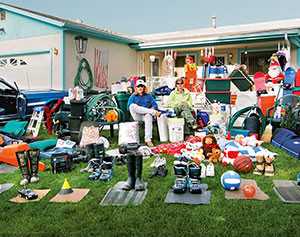By Oliver Bok

A scene from Werner Boote’s film Plastic Planet illustrates what is considered to be an over-dependence on plastic products in modern life. — Photo courtesy of Werner Boote
“We are the children of the age of plastic,” intones Austrian filmmaker Werner Boote in his 2009 film Plastic Planet.
Somerville Climate Action screened the documentary the Arts at the Armory on June 9 in support of a plastic bag ban currently being mooted by the city.
The documentary shows both the environmental costs and the risks to human health posed by the global plastic industry – an industry that Boote says has produced enough plastic to wrap the entire planet with plastic bags six time over.
Much of that plastic has ended up in the world’s oceans, wrecking-havoc on marine life as fish and other creatures continuously ingest small particles of plastic.
According to the film, plastic isn’t as chemically stable as it may seem and can break down over time due to heat, use, physical pressure and other environmental factors. When plastic breaks down, potentially dangerous chemicals — such as bisphenal A, which some studies have linked to cancer, heart problems, and altered hormone levels — leech out.
Compounding the problem, the chemicals used in the production of plastics are often kept secret by companies who don’t want competitors to copy their formulas, leaving consumers in the dark about what chemicals plastic products actually contain.
The city plastic bag ban is currently in the Board of Aldermen’s legislative committee. According to Melissa Lowitz, a member of Somerville Climate Action, the committee will probably meet at the end of the summer and hold a public hearing on the plastic bag ban in the fall.
“I think a lot of people are on board, it’s just a matter of what the options are,” Lowitz said. “Is it going to be charge for a bag, biodegradable plastic bags or an outright ban? Which businesses is it going to affect? A lot of the details still need to be worked out.”
After the film, State Representative Denise Provost spoke briefly to the Armory audience about her own efforts to pass a statewide plastic bag ban. To Provost, her bill never emerged from the Ways and Means committee because of corporate lobbying.
“Big industries that rely on these products are very well represented in government. They have lobbyists and make their feelings known,” Provost said. “An important thing for regular people to do is speak up.”















Reader Comments